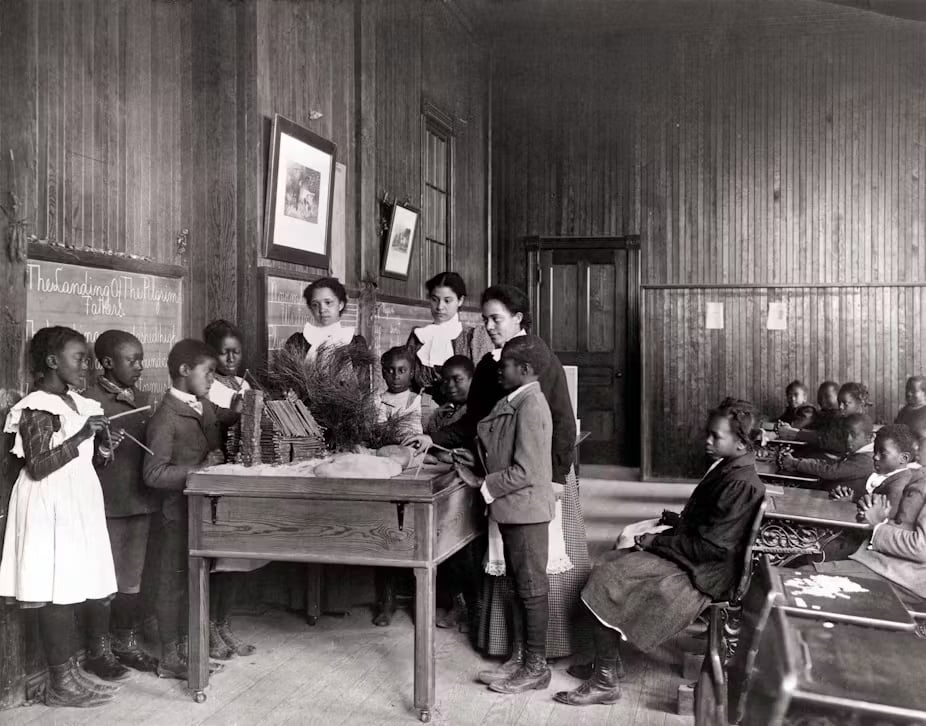
Feb 14, 2025 8:05:07 PM
Ed Post has partnered with the Center for Black Educator Development and Philly's 7th Ward to lift some of the greatest minds in Black education, the Black Educator Hall of Fame. There will be one honoree for every day of the month, but let's begin with these four remarkable individuals.
What were you doing at 13? That's the age Booker started her own schooling in the Jim Crow South, where numerous barriers were blocking her path to educate herself.
Despite such humble beginnings, Booker became a force for change in Black education. In early 20th-century Virginia, she fought for better schools, equal pay for Black teachers, and expanded access to high school education. Through tireless advocacy and securing funding from the Rosenwald Fund, she helped build schools, improve facilities, and even establish student transportation and healthcare services. Booker didn't just work within the system—she reshaped it, proving that determined educators can drive lasting change. Her legacy is a powerful reminder that the fight for education equity is far from over.
Letitia Woods Brown didn't just study history—she made it. As the first Black woman to earn a Ph.D. in history from Harvard, she shattered barriers in academia and dedicated her career to documenting the lives of Black Americans in Washington, D.C. Her groundbreaking book, Washington from Banneker to Douglass, 1791–1870, remains a cornerstone in urban and Black history studies.
Brown was the first full-time Black faculty member at George Washington University. She fought to preserve and elevate Black history at a time when it was often overlooked. Her work laid the foundation for future scholars and ensured that the stories of Black communities weren't erased from history.
Brown's legacy is a testament to the power of education, storytelling, and advocacy. She showed that history isn't just about the past; it's about shaping the future.
Sterling A. Brown was a poet, critic, and educator who dedicated his life to bringing Black folk culture into the heart of American literature. Born on Howard University's campus in Washington, D.C., he was the son of a former slave turned Howard Divinity School professor and a mother who taught in D.C. public schools for over five decades. Educated at Williams College and Harvard University, Brown chose to focus his work on the authentic experiences of African Americans, drawing inspiration from their stories, songs, and everyday lives.
In 1929, Brown began a 40-year teaching career at Howard University, where he influenced generations of students.
Mary Smith Peake (1823–1862) was a trailblazing African American educator whose unwavering commitment to literacy transformed the lives of many in the antebellum South. Born free in Norfolk, Virginia, Peake defied the racist laws of the day by secretly teaching both enslaved and free Black Americans to read and write.
In the fall of 1861, under the historic Emancipation Oak near Fort Monroe, Peake began teaching freed slaves, marking the beginning of formal education for Black Americans in the area. As the first Black teacher employed by the American Missionary Association, she instructed over fifty children during the day and twenty adults at night, fostering a community of learning amidst the turmoil of the Civil War.
Peake's dedication to education laid the groundwork for Hampton University, an HBCU. Her legacy endures, inspiring generations to value education as a means of achieving equality and justice.
Few issues in education spark more tension and debate than standardized testing. Are they a tool for equity or a burden on students? A necessary check on school systems or a flawed measure of...
Charter schools are public schools with a purpose. Operating independently from traditional school districts, they're tuition-free, open to all students, and publicly funded—but with more flexibility...
Despite the benefits of a diverse teaching force, prospective teachers of color fall out of our leaky preparation pipeline at every stage: preparation, hiring, induction, and retention. Here’s what...
Ed Post is the flagship website platform of brightbeam, a 501(c3) network of education activists and influencers demanding a better education and a brighter future for every child.
© 2020-2025 brightbeam. All rights reserved.
Leave a Comment